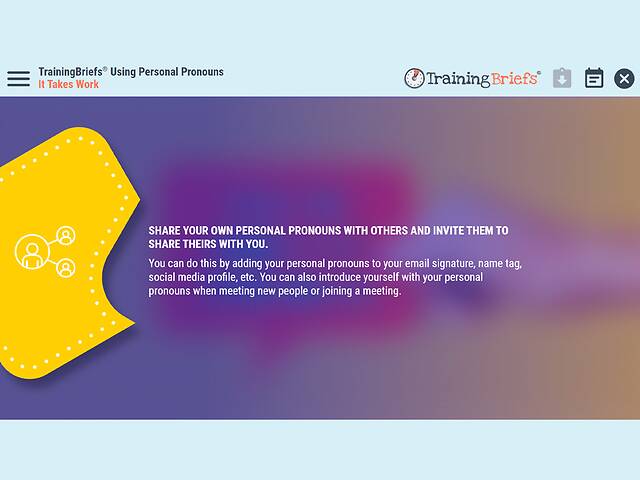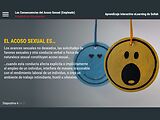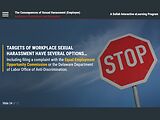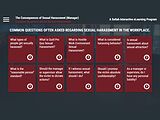
TrainingBriefs® Using Personal Pronouns
5 Minutes Level: Foundational
Personal pronouns are the words that we use to refer to ourselves and others in place of names, such as he, she, they, etc. These pronouns are not just grammatical markers, but also expressions of identity and respect. Using the correct personal pronouns for someone shows that you acknowledge and value their gender identity, which may or may not align with their biological sex or appearance. Using the wrong personal pronouns for someone, intentionally or unintentionally, can cause them to feel invalidated, disrespected, or even discriminated against.
Target Audience: General
Language: English
0

Features
- Audio Narration
- Interactive Exercises
- Video
- Post-Assessment
Learning Objectives
Description
Personal pronouns are the words that we use to refer to ourselves and others in place of names, such as he, she, they, etc. These pronouns are not just grammatical markers, but also expressions of identity and respect. Using the correct personal pronouns for someone shows that you acknowledge and value their gender identity, which may or may not align with their biological sex or appearance. Using the wrong personal pronouns for someone, intentionally or unintentionally, can cause them to feel invalidated, disrespected, or even discriminated against.
Using personal pronouns at work can help create a more inclusive, supportive, and respectful workplace culture for everyone.
- When people share their personal pronouns and use them correctly for others, they demonstrate honesty, transparency, and openness. They also show that they care about listening to and understanding others' perspectives and experiences.
- When people feel seen, heard, and valued for who they are, they tend to have higher self-esteem, confidence, and satisfaction. They also feel proud of their work and their contribution to the organization.
- When people feel safe expressing their authentic selves and explore their potential, they tend to have more curiosity, enthusiasm, and willingness to try new things. They also feel more comfortable sharing their ideas, feedback, and suggestions without fear of judgment or rejection.
- When people feel accepted, respected, and protected at work, they tend to have lower stress, anxiety, and depression. They also feel more loyal, committed, and engaged with the organization.
Learning Topics
Industry Settings
- Healthcare
- Industrial & Manufacturing
- Office & General
- Retail
Compatibility Notes
- Supports iPhone & iPad App: TrainingFlow™ App on iOS devices
- Supports Android App: TrainingFlow™ app on Android devices
- Supports Current Browsers: Chrome 60+, Firefox 60+, Safari 12+, Edge 16+
Similar CoursesShow More | Topic | |
|---|---|---|
 | TrainingBriefs® It’s That Time Again | Harassment |
 | Your Path to Success™ (Complete Series) | Communication |
 | SafetyBytes® - Hazardous Gases (Ignoring the Need for PPE) | Workplace Safety |
 | The Consequences of Sexual Harassment™ (NY/NYC Employee) - Spanish Version | Sexual Harassment |
 | The Consequences of Sexual Harassment™ (DE Employee) | Sexual Harassment |
 | The Consequences of Sexual Harassment™ (NY/NYC Employee) | Sexual Harassment |
 | TrainingBriefs® What’s His Problem? | Diversity Dynamics |
 | TrainingBriefs® Recognizing Sales Opportunities | Sales & Service |
 | TrainingBriefs® Everyday AI: It’s Already Part of Your Job | General Information |
 | The Consequences of Sexual Harassment™ (NY/NYC Manager) | Sexual Harassment |
